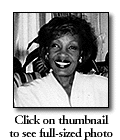Aryola Taylor
Project Director, Adult Literacy Instructors' Training Institute, (ALIT), 1990-1995
Advisor, Division of Adult and Occupational Education,
Adult Literacy/Adult Basic Education Program, 1978-1990
Project Director, Watts ABE Outreach Recruitment and Retention Program, 1975-1978
Branch Coordinator, Jordan-Locke Community Adult School, 1973-1975
Instructor, Jordan-Locke Community Adult School, 1965-1973
Excerpt from an interview with:
ARYOLA TAYLOR by LINDA L.WEST
October 27, 1995
Los Angeles, California
TAYLOR:
A lot of things I suppose I've forgotten, but perhaps the things I most
remember that I have used in my career as an instructor that really come to
mind are: the use of the language experience story and how powerful that could
be in instructing students, especially students who had low literacy skills. I
didn't realize that something so simple could be so powerful. The thing that
happened for us there was we did everything.We were there five weeks, so it
was like a laboratory.We tried everything.We practiced, we had homework.It
was just great.And the next thing, the importance of using informal
evaluations and how we could develop them. I remember when they introduced us
to the Cloze test and how you develop that.That was very unique for me.I
remember those two things because I came back and I immediately began to use
those.
I think a little bit after I came back from Kansas City, I had in my classroom a student who was a nonreader.He had been blind and had had surgery, had regained his sight, but he still was a nonreader. And at the time, we didn't have a lot of materials — we still don't have a lot of materials now — for the nonreader. So I reflected back to Kansas City, decided we're going to do the language experience story. That was all I used for this student, the language experience story.When we finished, he had about a three inch binder that was full of his stories, with accompanying pictures, his vocabulary lists. He had his language master cards developed, he had flash cards, he had stories he had copied. We had all of the reinforcement exercises we had done with the phonics that accompanied his stories. Everything was in his notebook.And he would go from the beginning and read through his stories and go through his cards. And I would imagine that … I can't remember how many cards he had, but I think the stack would be probably about five inches high of single words.
WEST:
My goodness.
TAYLOR:
After a little bit, oh, I can't remember how long the student was in my class,
maybe about two years or so, he was able to take the test for the Los Angeles
Unified School District, pass it, and get a job.
WEST:
Wonderful!
TAYLOR:
And all we used was the language experience story.The thing that I think
happened to him as a result of that, but everything else that went on in the
class, was that he felt empowered, that his education was in his hands.He had
five children, and I found out he went back home and he would tell his children
that " I have homework, so I'm sure you should have homework. No television.
Let's eat, clear off the kitchen table," (or the dining room table, wherever
they would be). "I'm doing my homework, so you're going to do your homework."
He went to school, he went to the PTA meetings, he went to the open houses at
school, and then he would come back and say, "Miss Taylor.…" (And we were on
Mr.and Mrs.) He would say, "Miss Taylor, I went to this class and I asked my
son's teacher 'Why don't you have… ?"' and he would use some of the
materials we had that he had seen in class. But he was empowered.He was then
in control of his own education, more in control of his environment, and more
in control of his children's learning. And it all happened with the language
experience story. There were so many experiences that he told me about, and in
some cases there were tears, but it was such a wonderful experience.So I
always say, " After Kansas City I really think I really blossomed as an
instructor."

